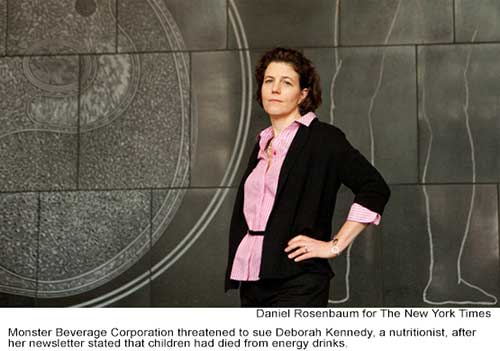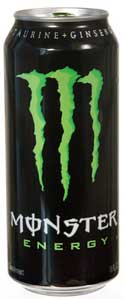In a New Aisle, Deadly Energy Drinks Sidestep Some Rules

- By BARRY MEIER - The New York Times - March 19, 2013
Fans of Monster Energy, the popular high-caffeine energy drink, may not notice the change: its ingredients will be the same and its familiar label bearing a green, clawlike monogram will change only slightly. But the drink’s maker has decided after a decade of selling it as a dietary supplement to market it as a beverage, a switch that will bring significant changes in how it is regulated.
 Among them: Monster Beverage, the nation’s biggest seller of energy drinks, will no longer be required to tell federal regulators about reports potentially linking its products to deaths and injuries.
Among them: Monster Beverage, the nation’s biggest seller of energy drinks, will no longer be required to tell federal regulators about reports potentially linking its products to deaths and injuries.
The company’s recent move, which follows a similar regulatory makeover by another brand, Rockstar Energy, comes amid intensifying scrutiny of energy drink safety. On Tuesday, a group of 18 doctors and researchers sent a letter to the Food and Drug Administration urging it to take action to protect adolescents and children from the possible risks of high caffeine consumption. “There is evidence in the published scientific literature that the caffeine levels in energy drinks pose serious potential health risks,” the researchers wrote.
Monster Beverage’s new cans will also disclose caffeine content for the first time. A 16-ounce can of Monster’s most popular energy drinks will contain 140 to 160 milligrams of caffeine, compared with about 330 milligrams in a 16-ounce cup of Starbucks coffee.
The company is fighting back against critics on several fronts. This month, it held a news conference to dispute accusations in a lawsuit that the death of a 14-year-old girl was linked to high caffeine levels in Monster Energy. Separately, it threatened to sue a nutritionist who publishes a newsletter for elementary schools for statements that it said were defamatory.
The changes by Monster and Rockstar demonstrate the degree to which energy drink manufacturers can decide which rules to follow.
“We don’t have energy drinks defined by any regulation,” Daniel Fabricant, director of the F.D.A.’s dietary supplement division, acknowledged in an interview in October.
For a decade, Monster sold its products as dietary supplements, apparently as part of a strategy to convince consumers that they were different from beverages. But the company, like its competitors, has run into a spate of bad news, including the disclosure in October that the F.D.A. had received reports in recent years that mentioned its drinks in connection with deaths and injuries.
Since then, the F.D.A. has received three more death reports and 14 injury reports that cite Monster energy drinks, an F.D.A. spokeswoman, Tamara Ward, said in an e-mail. In recent months, the agency has also received added reports about other energy products; since October, for example, it has received 38 reports that cite the popular energy “shot” 5-Hour Energy, including five involving a death.
The mention of a product in an incident report filed with the F.D.A. does not mean the product played a role in a death or injury, and such reports may provide few details. Monster Beverage and the maker of 5-Hour Energy have insisted that their products are safe and unrelated to the reported episodes.
A spokesman for Monster, Michael Sitrick, said the company had decided to market its products as beverages for several reasons. One was to stop what he described as “misguided criticism” that the company was selling its energy drinks as dietary supplements because of the belief that such products were more lightly regulated than beverages. Another consideration, he said, was that consumers can use government-subsidized food stamps to buy beverages.
“Monster Energy drinks could equally satisfy the regulatory requirements” for either category, Mr. Sitrick said.
An executive vice president at Rockstar, Joseph Cannata, said the company had made the change because consumers found food labels easier to read. In January, all production of Rockstar energy drinks switched to those labels, he said.
Rockstar had previously disclosed its caffeine content.
A lawyer who represents supplement makers, Justin J. Prochnow, said companies like Monster and Rockstar might have had another incentive. Over the last two years, the F.D.A. has intensified its scrutiny of the supplement industry’s manufacturing practices, driving up production costs.
As beverage producers, Monster and Rockstar will face some reporting mandates, including some that are stiffer than the mandates for supplement makers. Such companies are required to notify the government when they think a product could cause injury, a rule intended mainly to limit the distribution of tainted food. In addition, they are required to maintain scientific data supporting the safety of any ingredients they use that are not already cleared by the government. They can also voluntarily notify the F.D.A. about adverse events possibly affecting individual consumers, a step Monster Beverage said it planned to take.
Mr. Sitrick said Monster’s move to list caffeine content followed its decision to join the American Beverage Association, an industry trade group, which urges member companies to make such disclosures. He estimated that half of the company’s products would list caffeine content by April, and 90 percent by May.
In a recent filing with the Securities and Exchange Commission, Monster Beverage, which is based in Corona, Calif., said that negative media reports about energy drinks had created “softness” in demand. Its stock, which traded for $83.96 last spring, closed at $49.72 on Tuesday, a decrease of more than 40 percent. Rockstar is privately held.
The energy drink industry also faces several investigations from federal and state officials into claims that its products provide benefits lacking in other caffeine sources, like coffee. Researchers say there is little evidence to support these claims.
At a recent news conference, Monster Beverage denied accusations that it was responsible for the 2011 death of a Maryland teenager who had consumed two 24-ounce cans of Monster Energy. The company said that tests were never conducted on the 14-year-old, Anais Fournier, to determine caffeine levels in her blood.
A lawyer representing her family, Kevin Goldberg, said a state medical examiner had found that the teenager, who had an underlying heart condition, died of a cardiac arrhythmia caused by caffeine toxicity. A spokesman for the chief medical examiner’s office in Baltimore declined to comment, citing continuing litigation.
Monster Beverage also claimed recently that the March issue of a newsletter sent to elementary school students and their parents contained defamatory statements that had “materially damaged Monster and its well-known brand.” It objected to several statements in the newsletter, Build Healthy Kids, including one that said children had died from energy drinks and should “never drink” them.
In a letter dated March 4, the company demanded that Deborah Kennedy, a nutritionist who publishes the newsletter, retract and correct the statements within five days or face a lawsuit.
Ms. Kennedy, who lives in Connecticut, said in an interview that she was stunned by the threat, in part because the newsletter never mentioned Monster Energy or any other product by name, but focused instead on the need for children to cut down on sugar-laden beverages.
In response, she called on one of Connecticut’s United States senators, Richard Blumenthal, who is a critic of the energy drink industry. Mr. Blumenthal’s office contacted Monster, which agreed to withhold legal action pending a meeting with Ms. Kennedy.
Ms. Kennedy, who holds a doctorate in nutrition, said she thought the audience for her newsletter, children from kindergarten through fifth grade, should not consume energy drinks. “They are going after me for reaching that segment, and it boggles my mind,” she said.
Mr. Sitrick, the Monster spokesman, said that the 7-year-old son of a Monster employee had received the newsletter at his school and was upset by it. The boy showed it to his father, who brought it to the attention of a company lawyer.
“No child, much less a 7-year-old, should be falsely informed that his or her father’s employer is a child killer, especially since there are no facts to support the allegation,” Mr. Sitrick said. He added that Ms. Kennedy had yet to meet with a lawyer for Monster.
Last week, Senator Blumenthal and two other Democratic lawmakers, Senator Richard J. Durbin of Illinois and Representative Edward J. Markey of Massachusetts, sent a letter to Monster Beverage urging it to apologize for the tone of its letter to Ms. Kennedy and asking whether the company had threatened others with lawsuits.
Mr. Sitrick said the company was still reviewing the letter but continued to believe that Ms. Kennedy’s statements were defamatory.


